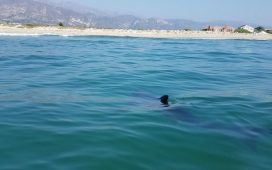There are fewer than 19 vaquita porpoises thought to be left, according to a study.
In 2016, estimates of the vaquita population stood at just 30, but research published in Royal Society Open Science suggests the figure has fallen further.
“Based on the uncertainty inherent in the models, the number could be as few as six,” said Prof Len Thomas, a statistician at the University of St Andrews and an author on the study.
The vaquita population lives in an area at the upper corner of the Gulf of California in Mexico. To estimate their numbers, the researchers recorded the vaquitas’ echolocation clicks using a large grid of acoustic sensors stationed over their habitat. Combined with visual sightings, the data shows a decline of 98.6% since monitoring started in 2011.
The critically endangered species get caught and drowned as a bycatch in gillnets. These nets are vertically suspended in water and the spacing of the mesh is supposed to allow only fish of certain size to be caught, but in practice marine mammals and sea turtles can quickly become entangled and drown.
Although the Mexican government banned gillnets in 2015, illegal fishing with them has continued and 10 dead vaquitas have been found caught in them since the ban. Those using gillnets are aiming to catch totoaba, a large marine fish whose swim bladder – an inflatable organ that helps to maintain buoyancy in the water – is highly prized in China for use in traditional medicine.
Dr Peter Evans, an honorary senior lecturer at Bangor University who was not involved in the study, said: “This paper by a group of very reputable scientists graphically demonstrates the precarious situation for [vaquita], with less than 20 estimated to remain on this planet.
“It is just possible that some individuals may have escaped notice in areas outside the core study area, and there are challenges in determining numbers from porpoise echolocation detections. However, the authors have done their very best to try to overcome these in the analyses conducted in the paper. The only way to save the species would be to ban fishing of this type in the Gulf of California.”
Thomas added: “We only have about a year left to save [the vaquita] from going extinct. The good news is that it’s a simple solution. With enough resources the Mexican government could protect them by cracking down on illegal fishing nets. We’re talking about an area less than the size of Greater London.
“The Mexican navy is perfectly capable of excluding those boats from the area. My hope is that through publicity we will inspire the Mexican government to undertake effective enforcement.”
Eva Hidalgo, science fepartment coordinator at Sea Shepherd Conservation Society, said, “The important takeaway is that they’re still out there. No matter how low the numbers are, there’s still hope for the species if we manage to keep them safe. Sea Shepherd is doing as much as possible to ensure the area remains net-free. In recent years we have seen two vaquita calves, so they can be saved. As long as there is one vaquita left, we are going to continue to fight for them.”








